Chaikuni Institute during the Peruvian lockdown
The pandemic hasn't made the work of the Chaikuni Institute any easier. Yet, they still managed to push through. A report.
The pandemic hasn't made the work of the Chaikuni Institute any easier. Yet, they still managed to push through. The team from Peru sent a detailed report of the ongoing work and effort to help local communities adapt to a agroforestry style of landuse.
Pandemic reveals past mistakes
On March 15th, only two weeks after our project with the FFBT officially started, Peru was put under a strict lockdown due to the corona pandemic. Our region in the northern Peruvian Amazon region was one of the first and hardest hit by the virus. The city of Iquitos went through a traumatic experience, as the lack of a decent health care system, infrastructure, medical personal, medicines and even oxygen led to the loss of unnecessarily many lives. The pandemic mercilessly exposed the weaknesses of our current “system”, and reminded us painfully of all the failures and thefts committed for decades in our Loreto region. Oil royalties and public funds have disappeared in the pockets of functionaries rather than being invested in health care and education.
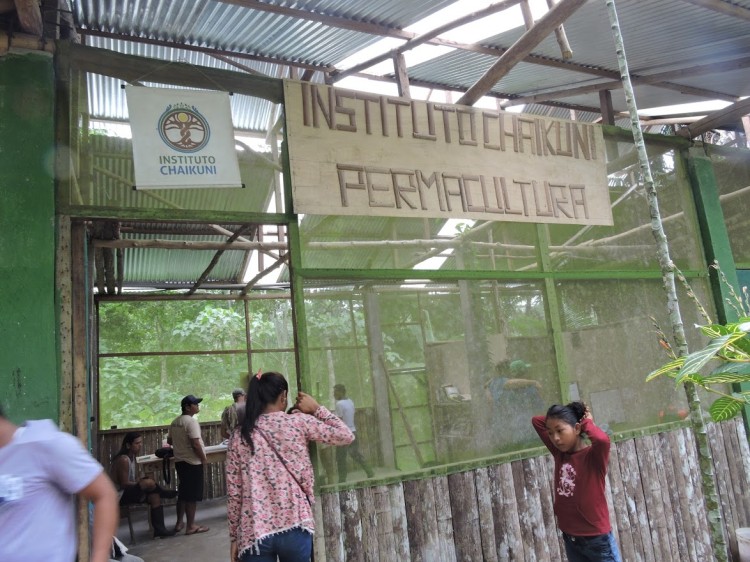
Other solutions
For us at the Chaikuni Institute, the situation also suddenly brought a lot of insecurity. As international and local travel was abruptly stopped, our main donor and ally, a traditional healing center situated in the rainforest a few hours away from Iquitos, had to temporarily close its doors. This meant that it could no longer provide monthly donations, fundamental core funding for our Institute. We thus had to look for alternatives elsewhere, and started a crowdfunding campaign, which was successful in raising funds that should bring us through this rather unusual year.
The lockdown in Peru was extended time and time again, and only lifted in the beginning of July, after 110 days of quarantine. But, rather than based on public health criteria, the discontinuation of the quarantine was the result of ordinary people and the government no longer being able to bear the socio-economic costs of “staying inside”. At around 3000 new daily cases, infection rates were still high in Peru. And things didn´t just go back to normal.
Just in time
While the pandemic impeded us to go about our work in the field from March until July, we fortunately had just finished a major training with local communities before we were ordered to stay at home. During the training in early March we planted three new agroflorestas, a specific form of agro-forestry that we experiment with. Two of our local staff live right next to our permaculture center, and, despite the lockdown, they were luckily able to look after our agro-forestry systems throughout the quarantine.
Nature, of course, was rather pleased with the break it got from us humans, and silently performed its miracles. In just a bit over three months, our agrofloresta plots went from barren earth to a lush emerging green, already gifting us with its first produce, a local species of beans. By now, Yucca (manioc), maize, Chaia, Katuk, beans, and the Cocona fruit have already been harvested, and much more produce is to be expected in the coming months. (continue reading after the pictures)
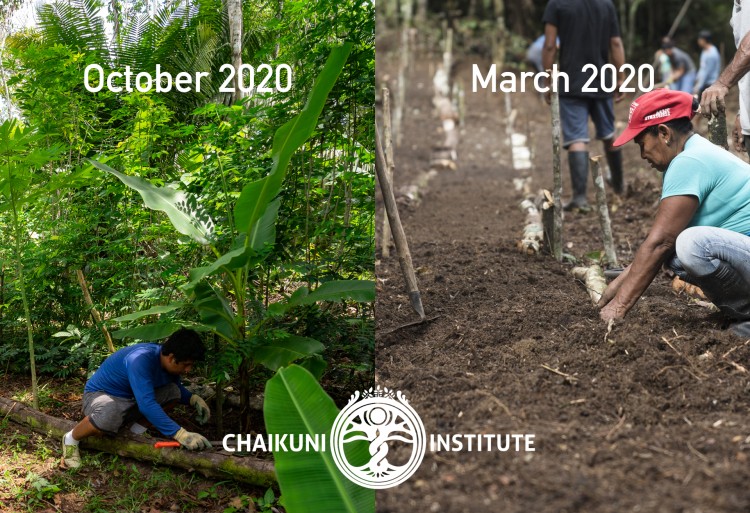
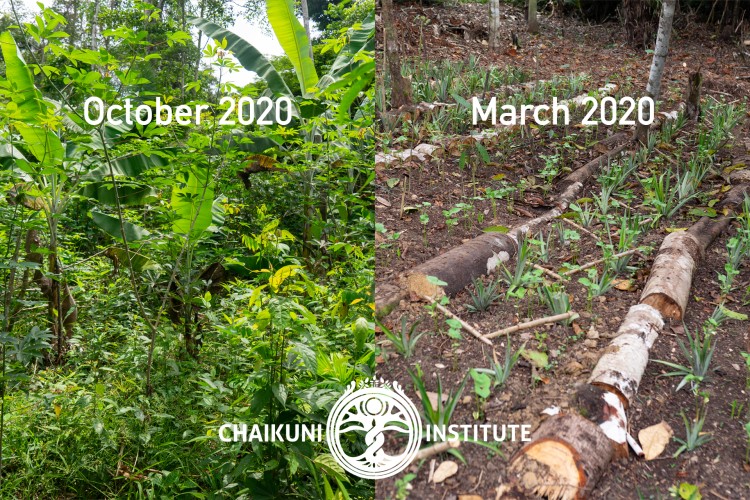
Restoring rainforest
One of three main components of our project with the FFBT is to promote diverse agro-forestry systems, which we locally call chacras integrales, with four of our neighboring villages, in order to regenerate degraded rainforest areas. Once we were again allowed to work in the communities, we re-established contact with the local farmers in august and visited them to speak of their plans and ambitions for their farming plots.
Starting in September, we so far have facilitated and accompanied 15 communal work days. This means that, with Chaikuni’s help, 15 local farmers took the first step to establishing a chacra integral on their land. Many more interested families have signed up to our project, whom our team will attend over the next months. The project aims to implement 24 hectares of chacras integrales in the target communities by the end of August 2021.
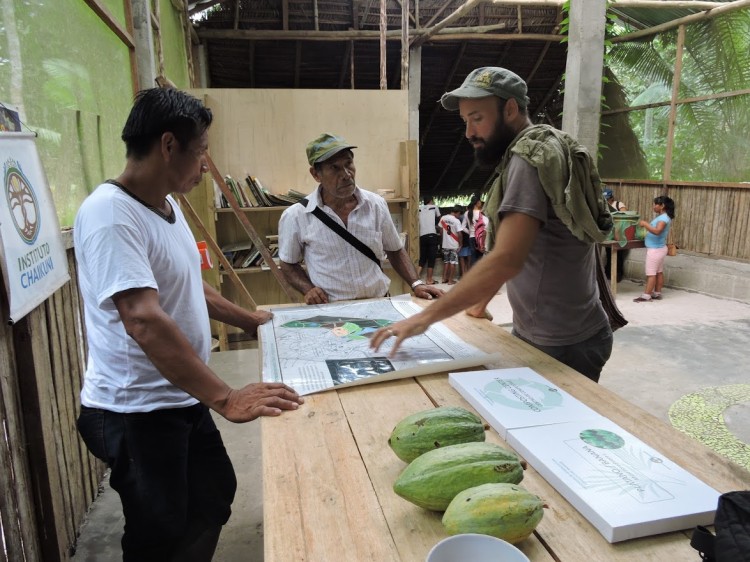
Get organized
We have also started to support the communities to get organized and work on communal land use planning, which is the second component of our project. The objective is for every community to define a communal agreement over how to sustainably use and control their territory and its resources over the next years and decades. We had a GIS specialist help us prepare special maps for each of the communities. So far we have held two communal land use planning workshops in the San Pedro village, with a third one planned very soon that will conclude the first stage of the process for this particular village.
All schools in Peru are closed since March, and teaching is generally held through television and virtual platforms. Due to this situation, we have not yet been able to work on the third component of our project, in which we plan to provide environmental education in the local schools of our target communities. We hope that the educational systems re-open with normality in March 2021, when the new school year usually starts here in Peru.
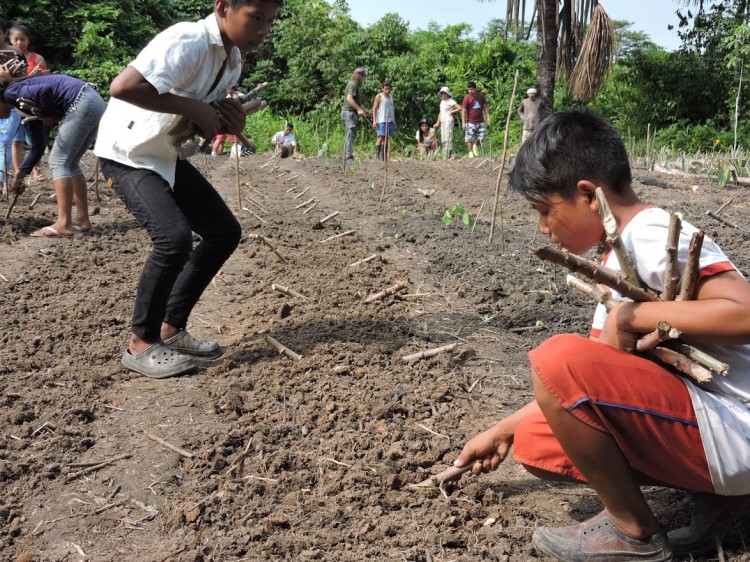
Catch up
While Europe and other parts of the world currently experience the feared second wave of the Corona-pandemic, we hope that the number of Covid cases remain low in our region, so that we can continue our work in the communities and make up some of the time we have “lost” to the pandemic. While we expect it to be intense, we remain optimistic that we manage to do so and achieve our objectives, as long as there won´t be a second lockdown.
In many ways, this pandemic urges us to reflect and re-think both our social relations as well as our relationship and interaction with nature. For example, knowing how to plant your own food and be self-sufficient has gained renewed importance. When transport and movement was restricted, many forest communities started to experience food shortages. This is very paradoxical in a region that historically had been gifted with an abundance of resources. But overexploitation and an overtly focus on growing few diverse crops, with techniques imported from outside, have caused the loss of traditional forest farming knowledge. Communities are increasingly weaved into regional trade networks, which has created more dependence on goods from the city. So when the lockdown was imposed it adversely affected many forest communities.
For us at the Chaikuni Institute, these happenings confirm us in the work we are doing and exemplifies the importance of promoting regenerative permaculture techniques such as sustainable and productive agro-forestry systems in our Amazon region.
